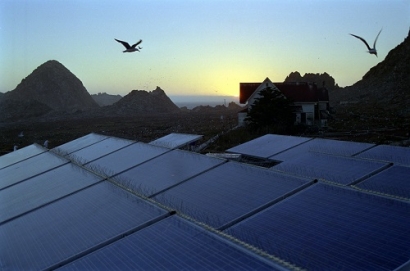
The report aligns with polling nationwide on renewable energy indicating that the public heavily favors renewable sources of energy. However with transmission lines being situated in areas that often run near residential development, the chances for opposition to these projects increase. The siting of wind farms is often popular, however Brookings found that if there is no financial benefit, and only a "view”, this often was a cause of opposition forming. While not often available or opportune, the report expresses the opinion that building on already disturbed land, or putting solar on roofs as an example, can help to lessen opposition.
The report discusses a survey conducted by Lawrence Berkeley National Laboratory of residents who live within five miles of recently erected utility-scale turbines. Of those surveyed, 57% viewed the local wind farm as positive, and for those who were actually within just a half mile of the wind farm, support dropped to 50% - not as large of a drop in support as one might imagine. While the report found the typical concerns of wind farms from residents, it also made note of a very prevalent problem for wind farm companies - multi jurisdictional siting. Often a two-town wind farm project can be delayed due to opposition in one community only. This is not uncommon.
The report focuses also on the transmission capacity "chicken and egg" problem, as it states, for renewable energy projects. Renewable projects are less economically viable without adequate transmission, yet at the same time, investments in renewable are needed to support the building of new transmission.
Brookings suggests that advances in technology can also help lessen public opposition to renewable energy. Offshore wind is one such advance, that while not without critics, seems to have come a long way since the Cape Wind days of that ill-fated project. Technology can also make solar more palatable to residents. Solar can be installed on water, with floating PV systems.
The Brookings Institute Report is well worth reading, and keeping in mind that when it comes to public or political opposition to renewable projects, some basic steps to gain the upper hand and win support are necessary in this goal. Some common tactics are:
Media Relations - When announcing your project, sit down with reporters and editors of local newspapers or online papers to review the project, hand out the facts and benefits. When articles are printed on the project, you want them to at least have your facts, and include you into the piece.
Keep Track - Have a database of supporters, so that you can reach out to residents prior to key meetings and public hearings. This simple step is often forgotten on renewable projects. The database can have your supporter's e-mail, phone, address and notes. Some supporters will do more than others, and it is critical you differentiate this.
Forums - Hold open houses and charettes on the project. Mail invites to neighbors, or those in the closest view shed of the turbines or solar panels, and invite them, along with other community members. Have your experts all there - bird, blade, solar and all.
Promote- Using direct mail, social media platforms and a website, your project must be promoted. Have a portal to answer resident's concerns, and a portal for residents to support the project.
Meetings - Meet with community stakeholders and residents who announce their support of the project. Enlist them to write editorials, letters to the editor, e-mail local and regional leaders in support, and attend public hearings and speak in favor of your project.
Early planning, intense outreach, and coalition building can help you avoid delays, avoid cancelations, and move your renewable projects forward.
Al Maiorino started Public Strategy Group, Inc. in 1995. His firm has developed and managed multiple corporate public affairs campaigns in a variety of industries such as gaming, cable television, retail development, auto racing, energy and residential projects. Additionally, his firm has worked on projects in twenty-six states and three countries.

